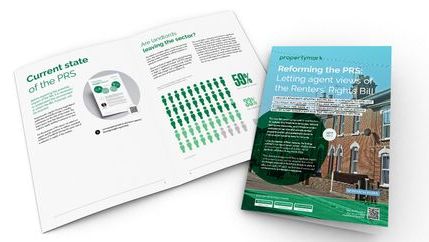
A ‘transformative’ system of periodic tenancies
The argument put forward by the UK Government is that removing fixed-term assured tenancies, and instead allowing tenants to end a tenancy with two months' notice, will give renters more flexibility to move if their circumstances change, for example due to a new job, a relationship breakdown, or because they’ve bought a home of their own. They also point to situations where tenants are obliged to continue paying rent for a substandard property until the end of an annual contract.
Propertymark strongly challenges this proposal. When we surveyed our members in December 2023, 93% said that removing fixed-term tenancies would negatively affect both agents and landlords.
A fixed-term benefits both parties, with security of tenure for the tenant and a guarantee of rent payments for the landlord. For tenants with low income or poor credit history, the fixed term allows a guarantor to be confident about the length of time they are signing up to support them.
Furthermore, the student rental market relies on fixed-term agreements to facilitate the availability of properties in line with the academic year, and removing this mechanism could seriously disrupt the market.
Grounds for possession
A 12-month protected period will be introduced at the beginning of a tenancy during which landlords cannot evict tenants in order to sell or move into the property. A four-month notice period will be required for these grounds.
If the tenant is at fault, notice using a relevant Section 8 ground can be served at any point during the tenancy. However, rules will be tightened to protect tenants who fall into temporary arrears by increasing the mandatory threshold for eviction from two months to three and extending the notice period from two weeks to four. Discretionary grounds will remain available for lesser arrears and persistent late payment.
A number of specific grounds will be introduced for sectors, such as student accommodation, where it is necessary for tenants to move out in order to free up places for eligible occupants. This would also include temporary or supported housing, and properties used in schemes such as ‘stepping stone’ accommodation. Propertymark has called for the student ground to extend to all student sharers, for instance households with two renters, and not just HMOs.
When the Renters (Reform) Bill was being considered in the last parliament, Propertymark highlighted concern amongst landlords due to a lack of confidence that the available grounds gave them adequate protection. We will work with the current UK Government to ensure that there are adequate mandatory grounds, and that courts are given clear principles for fair decision-making.
Rent increases and Tribunal reform
Ministers want to standardise the way rent increases are applied by setting a process that must be followed for all tenancies. Once a year, landlords will be able to increase rents up to the market rate (defined as the price that would be achieved for the property as a newly advertised let) by issuing a Section 13 notice which sets out the new rent and gives at least two months’ notice before it takes effect.
As currently, tenants will be able to challenge increases they believe are above market rate through the First-Tier Tribunal. Plans to increase consumer confidence in this process include preventing the Tribunal from recommending a rent higher than the landlord has asked for and ending the practice of back-dating increases. The Tribunal will also gain the power to defer increases for a further two months in cases of significant hardship.
Decent Homes Standard and Awaab’s Law
Propertymark has long argued that renters in the private sector should receive the same service, standards and protections as those in the social sector, where a Decent Homes Standard is already in place and there is a requirement for property managers to be qualified.
It is important that the Standard works in practice for different types of property, and that adequate time and support is available for property owners to bring homes up to standard where necessary.
Compulsory Ombudsman membership for landlords
Regardless of whether they use a professional agent or not, landlords will have to join a new Ombudsman service which will provide complaint resolution services for tenants and have the power to compel landlords to issue apologies, provide information, carry out remedial action, and pay compensation.
Agents who advertise properties where the landlord is not registered could face enforcement action from local councils, ranging from civil penalties of up to £7,000 to criminal prosecution or fines of as much as £40,000 for repeated breaches. These penalties will also apply to the landlords themselves, and tenants will have the right to seek Rent Repayment Orders if their landlord persistently fails to register with the Ombudsman.
There are no planned changes to the existing property agent redress schemes, which Propertymark believes to be a missed opportunity to address issues such as the lack of requirement or clear guidance for a complaints procedure, and no universal code of practice for the private rented sector, which results in inconsistency across the sector
We have also long felt that reforms to the private rented sector should include the requirement for an inventory and a check-in/check-out report at the start and end of tenancy to speed up the return of deposits and prevent disputes. This should work alongside the new requirement to provide a Written Statement.
PRS Database
Landlord registration schemes are already compulsory in Scotland, Northern Ireland, and Wales. However, they have had mixed success and offer significant opportunities for lessons to be learned in England.
It will be the expectation that letting agents will need to check if a landlord and property are correctly registered on the Database before they market a property for let. Property agents will face penalties if they advertise or market residential properties for rent which are not registered.
Once established, the Database will incorporate further information related to property standards. Propertymark continues to campaign for the requirement for local licensing schemes to be removed once the Database is up and running.
Ending bidding wars and discrimination
Guidance on the Renters Rights Bill states that the UK Government intends to level the playing field for renters, and crack down on a minority of unscrupulous landlords who exploit the housing crisis to increase their rental income.
To prevent competitive bidding, the Bill will require landlords and letting agents to publish an asking rent for a property, and make it illegal to ask for, encourage, or accept any bids above this price. Flouting these rules could lead to civil penalties of up to £7,000.
Although landlords and their agents will still have the final say over who rents a property, checks must be based on affordability and it will be illegal to refuse a tenancy purely because a prospective tenant has children or receives benefits. The UK Government say that they are working closely with the Welsh and Scottish Governments to ensure these measures are applied in England, Scotland, and Wales.
Given the pressure from tenants due to the lack of supply of homes to rent, Propertymark will call on the UK Government to provide detailed guidance on the process for advertising and documenting rental negotiations. Property agents play a key role in ensuring property and tenancy arrangements are suitable for both tenants and landlords, so rather than focusing on over prescriptive measures the legislation must not reduce choice and push up costs.






